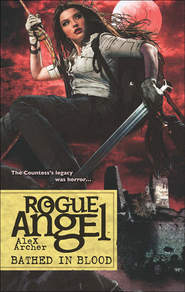По всем вопросам обращайтесь на: info@litportal.ru
(©) 2003-2025.
✖
Cradle Of Solitude
Автор
Год написания книги
2019
Настройки чтения
Размер шрифта
Высота строк
Поля
Benedictine monks. She couldn’t think of any obvious connection between the religious order and the Confederacy, but it wasn’t her area of expertise. Still, there had to be a connection, for no one went through the kind of trouble Parker had to hide a piece of paper if it wasn’t important.
The monastery was the key to this mystery.
She was sure of it.
“Is it far from here?”
Bernard shrugged. “Four, maybe four and a half hours by car. There’s a train that runs in that direction, as well, but you’d have to find transportation up the mountain. Not much sense in going, though.”
“And why’s that?”
“It’s closed to the public. Outside visitors have to be approved in advance by the abbot and the process takes several months. I spent some time there a few years ago examining one of the books they have in their library and I remember the process being an absolute nightmare to get through.”
“So you’ve met the abbot?”
“The abbot, hmmm. Abbot Deschanel. Yes, I have. A charming man, actually.”
“Would he remember you?”
“I should think so,” Bernard told her. “We spent several evenings discussing a variety of topics over a glass of wine or two and I…” He paused, finally putting two and two together. “Oh, no.”
Annja smiled at him sweetly. “What?”
“You want me to call over there and try to get you in to see the abbott without going through the standard process.”
“You’d do that for me?” she replied, letting her eyes go wide and feigning innocent surprise.
Bernard laughed. “I’m supposed to believe that the idea never even occurred to you, right?”
“You can believe what you want. But now that you’ve brought it up I think it’s an excellent idea.”
“It’s been more than a hundred years, Annja. What do you expect to find?”
She shrugged. “I don’t have any idea. But I’m sure something will occur to me once I’m there. There has to be a reason that Parker went through all the trouble of hiding the name of the monastery inside the seam of his shirt. That doesn’t just happen by accident.”
Bernard considered that statement. “You think he knew he was going to run into trouble,” he said slowly, thinking it through, “and he took precautions in case he did?”
“I do. And I think somewhere in that monastery is the answer to just what kind of trouble he was expecting. If we know that, we might be able to figure out just what he was doing here in France in the first place. Isn’t that the point of all this?”
She knew she was stretching things a bit. The authorities hadn’t been all that clear on exactly what they wanted her and Bernard to do. Identify the body if at all possible, sure, but given the state of the skeleton they probably didn’t expect them to have all that much success. Turning the skeleton over to the museum had pretty much achieved what the police had most likely wanted to achieve, which was passing the buck on to someone else. Now that the skeleton wasn’t in the catacombs and potentially slowing down the construction of the Metro tunnel, the details really weren’t all that significant to the police.
But they were to Annja. Now that she was involved, she was determined to find out all she could about Captain Parker’s fate, if indeed the skeleton really was his.
She thought it was. Regardless of how outlandish the idea sounded when said aloud, at this point she was all but convinced that she was right. She wasn’t sure why she felt that way, as the evidence was scant at best, but something deep inside rang true at the thought. That meant tracking down what had actually happened to him might possibly lead them to the missing Confederate treasure, as well. And that was definitely a prize worth pursuing.
In order to do that, she had to get inside the monastery.
“So you’ll do it?” she asked.
Bernard, however, wasn’t convinced. “I’ll give it some thought,” he said.
Deciding she wasn’t going to get any more out of him at this juncture, Annja let the matter rest for the time being. She’d hit him up again before leaving that afternoon once he’d had a chance to think it over.
In the meantime, she had a lot of work to do.
8
About the time that Annja was examining the sword, Blaine Michaels, a direct descendant of the man who had fired the shot that had taken Captain Parker’s life, received a phone call at home from the same computer technician he’d spoken to earlier that afternoon.
The information he received was more complete this time around, outlining what had happened in the tunnels earlier that morning.
“You’re certain that they said the skeleton came from inside the catacombs and not the Metro tunnel itself?”
“Yes, sir.”
Michaels grunted, most decidedly not thrilled with those circumstances.
“And the Creed woman?”
“Because the skeleton was dressed in the uniform of a U.S. soldier, the police contacted the embassy and asked to have a representative present. Apparently the Creed woman was suggested by someone on the ambassador’s staff and was brought in to represent their interests.”
He didn’t bother to correct the misinformation in his subordinate’s report; he had better things to do with his time than explain the difference between the Confederate States and the United States. It was the fact that they had discovered the body at all that had him on edge.
He didn’t exactly know why. After all, the body had been down there in the dark for more than a hundred years. There was nothing that could tie his family or the organization as a whole to the crime, if it could even be called a crime at this point, and there was little enough to be done even if they could.
Relax, he told himself.
But no matter how hard he tried, he couldn’t. After struggling against it for some time, he got up and made his way to his study. Locking the door behind him, he moved over to the safe, knelt in front of it and dialed the combination lock. Opening the door, he reached deep into the back, past the stacks of cash and bearer bonds, and took out his great-grandfather’s journal.
The old man had recorded the events of the night in question in considerable detail, just as he’d been taught to do. As the current head of the society, Blaine had done the same thing himself many times, making note of the steps he’d taken and the motivations behind them so that the one who followed in his footsteps—his son, most likely—would understand how those actions fit into the society’s long-term plans.
He wasn’t troubled by what had happened that day, at least with regard to the actions the society had taken. Anyone who crossed them would meet a similar fate. No, what was troubling were the goals they’d failed to meet—namely, determining where the traitor had hidden the treasure promised to them. His great-grandfather had been unable to force the information from the traitor before killing him and all of their searches to date had ended with nothing to show for them.
Blaine Michaels had been haunted all his life by his great-grandfather’s failure. Those in the society had long memories and there had been considerable opposition to his rise to power as the group’s current leader, but he’d been determined to win back the position of power his great-grandfather had forfeited in the face of his failure.
More importantly, he was determined not to let history repeat itself.
And that, he realized, was the source of his unease.
He couldn’t seem to shake the feeling that there was something they had missed that night, something that might have provided the clue they needed to figure out just where the treasure had been hidden.
Blaine knew that the original meeting had quickly devolved into an argument, which in turn led to violence. A running gun battle through the catacombs had ended with both men wounded, the traitor mortally so. Time had been of the essence in getting his great-grandfather to safety. Afterward, there was confusion about where, exactly, the traitor’s body had been left behind and the searches that followed had been unable to locate it in the hundreds of miles of twisting tunnels beneath the Paris streets. Eventually, his great-grandfather had been forced to step down from the position of leadership and the incident had been swept under the rug as a total failure.
But now, it seemed, there was a chance to correct the errors of the past. If the body held information that might lead them to the missing treasure, then he couldn’t afford to pass up the chance to find it.
Decisive action. Yes, that’s exactly what the situation needed.
Satisfied he’d come to the right conclusion, he reached for the phone.











